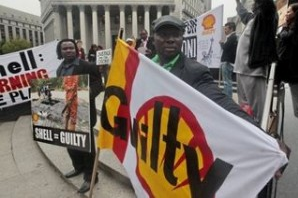Another Supreme Court boost for corporate unaccountability?

By Phil Mattera, Dirt Diggers Digest
Global corporations often think they are above the law, but for more than a decade some of the most egregious human rights and environmental violators have had to answer for their overseas actions in U.S. courtrooms. It now appears that the conservatives on the Supreme Court want to put an end to this key tool of corporate accountability.
The controversy surrounds a once-obscure 1789 law known as the Alien Tort Statute or the Alien Tort Claims Act (ATCA). It allows foreign citizens to bring civil actions in U.S. courts involving violations of international law or a treaty signed by the United States. The long dormant law was revived in the 1980s by the Center for Constitutional Rights (CCR) as a vehicle for pursuing individual human rights violators and later came to be used against corporations as well.
One of the latter cases, involving Royal Dutch Petroleum, the parent of Shell Oil, made its way to the Supreme Court, where during recent oral arguments justices such as Alito and Kennedy expressed disdain for ATCA. Disposing of any remnant of American exceptionalism when it comes to human rights enforcement, Justice Alito insisted that allegations of Royal Dutch complicity in torture in Nigeria have "no connection" to the United States. "What business does a case like that have in the courts of the United States," he complained.
Following the oral arguments, the Supreme Court seemed to signal that it wants to address (and quite possibly strike down) ATCA cases against individuals as well as corporations. It asked for additional briefs to be filed by June and will hear new arguments during the court's next term. This move puts off the day of reckoning for ATCA for some months, but if the tenor of the recent oral arguments reflected the thinking of the justices, ATCA will not be with us for much longer.
To get a sense of what we may be losing, it is worth taking a look at how ATCA has been used to address corporate transgressions. Apart from the Royal Dutch matter still before the Supreme Court, here are some of the main cases that have been brought:
Doe v. Unocal. This pioneering corporate ATCA case was filed in 1996 by a group of Burmese citizens against U.S.-based Unocal (later taken over by Chevron), which was accused of complicity in abuses such as forced relocation, forced labor, murder, rape and torture by the Burmese military during the construction of a gas pipeline project sponsored by the company and the military. The case, brought with the help of CCR and EarthRights International (ERI), was settled out of court in 2005.
Wiwa v. Royal Dutch Petroleum/Shell Oil. In 1996 CCR and ERI helped bring an earlier case against Royal Dutch and Shell involving human rights abuses in Nigeria, especially the execution of Ogoni activist Ken Saro-Wiwa in 1995. On the eve of a trial in 2009, the companies agreed to a $15.5 million settlement.
Bowoto v. Chevron. In 1999 a group of Nigerians of the Niger Delta region, where Chevron is engaged in oil production, brought suit against the company, which they accused of complicity in torture, summary execution and other human rights abuses carried out by the Nigerian police and military against people protesting environmental violations on the part of the company. In 2008 a federal jury ruled in favor of the company, but the plaintiffs, who have been aided by CCR and ERI, filed an appeal which is pending.
Sarei v. Rio Tinto. In 2000 a group of residents of the island of Bougainville in Papua New Guinea (PNG) brought an ATCA suit against this mining giant, alleging that it was complicit in crimes against humanity committed by the PNG army during a secessionist conflict. The plaintiffs also accused the company of environmental crimes. The case has gone through a series of twists and turns over the past decade and is still pending after the U.S. Court of Appeals reversed a lower court’s dismissal of the case last October.
John Doe v. Exxon Mobil. In 2001 a group of villagers from the Indonesian province of Aceh, working with the International Labor Rights Fund (ILRF), brought an ATCA case accusing the oil giant of complicity in human rights abuses committed by Indonesian security forces. For more than a decade the case has made its way through various courts and remains unresolved.
SINALTRAINAL et al. v Coca-Cola et al. In 2001, several individuals and the Colombian trade union SINALTRAINAL, with the help of ILRF and U.S. unions, brought suit against Coca-Cola and two of its Latin American bottlers in connection with the torture and murder of trade unionists by paramilitary groups. A federal judge removed Coca-Cola from the case, which was later dismissed in its entirety (though a related campaign continues).
It's clear from this brief review that ATCA cases have faced high hurdles and protracted legal maneuvering on the part of the defendants, and only rarely have they achieved success in the form of a settlement. In 2004 the Supreme Court, amid intense pressure from the corporate world and the Bush Administration, declined to ban ATCA cases, though it insisted that only a narrow category of cases could be brought under the statute.
A majority of the current Court seems less interested in such compromises and more inclined to sweep away ATCA in a Citizens United-type affirmation of corporate unaccountability that will be celebrated by repressive governments and their foreign investors around the world.
Note: A list of pending ATCA cases can be found on the website of International Rights Advocates. An excellent resource on ATCA cases and other issues involving the conduct of global corporations can be found on the website of the Business and Human Rights Resource Centre.
